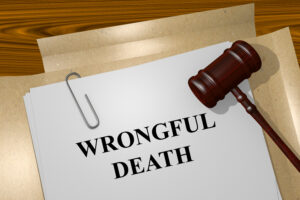The wrongful death statute of limitations is often a complex law that can vary from state to state. When a loved one’s life is tragically cut short due to someone else’s negligence or intentional actions, the surviving family members need to seek justice.
However, these cases can be time-sensitive, as there are strict deadlines within which a lawsuit must be filed. Understanding the intricacies of the statute of limitations can be daunting, which is why it is so important to seek legal guidance. If you have lost a loved one due to wrongful death, always act quickly and contact an experienced Texas wrongful death attorney near you who can provide the guidance and representation needed to pursue your claim.
Schedule A Free Case Consultation
Texas Wrongful Death Guide
- Understanding the Statute of Limitations
- Why Time Matters in Wrongful Death Cases
- Statute of Limitations, Exceptions, and Extensions
- What Does Wrongful Death Mean?
- Types of Wrongful Death Cases
- What if There is Also a Criminal Case?
- What Happens if Your Wrongful Death Case Isn’t Filed Within the Statute of Limitations?
- Damages Available in Wrongful Death Cases
- Contact a Wrongful Death Lawyer Today for Help
Understanding the Statute of Limitations
The statute of limitations refers to the time frame within which a legal action can be filed. In the context of wrongful death cases, it determines the period during which the surviving family members can bring a lawsuit against the responsible party. Each state has its statute of limitations for wrongful death claims, and it is crucial to be aware of the specific deadline in your jurisdiction.
Why Time Matters in Wrongful Death Cases

Time is of the essence in wrongful death cases for several reasons. First, it should be acknowledged that the emotional toll of losing a loved one can be overwhelming, and understandably, the grieving process takes time. However, at the same time, it’s important to remember that legal deadlines must be met to pursue a wrongful death claim.
Additionally, valuable evidence may deteriorate or become lost over time. Witnesses’ memories may fade, and physical evidence may degrade. By acting quickly, you increase the chances of preserving key evidence that can strengthen your case.
Furthermore, delaying the pursuit of a wrongful death claim can allow the responsible party and their insurance company to build a defense. It is in their best interest to minimize liability and avoid paying fair compensation. By seeking legal representation early on, you level the playing field and protect your rights.
Statute of Limitations, Exceptions, and Extensions
While the statute of limitations generally establishes a strict deadline for filing a wrongful death claim, certain exceptions and circumstances can extend or toll the deadline. It is important to be aware of these exceptions and consult with an attorney who can assess your case and determine if any of these apply to you.
Discovery Rule
In some cases, the statute of limitations may begin to run from the date that the surviving family member discovers or should have reasonably discovered the cause of death. This rule may be applicable if the cause of death was not immediately apparent or if there was deliberate concealment or fraud on the part of the responsible party.
Minors and Legal Disabilities
Suppose the person eligible to file a wrongful death claim is a minor or has a legal disability. In that case, the statute of limitations may be tolled or extended until they reach the legal age of majority or are no longer under a legal disability.
Governmental Immunity
In some instances involving government entities or employees, there may be specific procedural requirements or shorter deadlines for filing a wrongful death claim. It is important to consult with a wrongful death attorney familiar with the laws and procedures governing such claims.
What Does Wrongful Death Mean?
Wrongful death is a legal term used to describe a situation where the negligence, intentional harm, or misconduct of another party causes a person’s death. In such cases, the surviving family members or the estate of the deceased person may have the right to file a wrongful death claim and seek compensation for the damages they have suffered as a result of the death.
Wrongful death cases can arise from various incidents, including car accidents, medical malpractice, defective products, workplace accidents, and more. It is important to note that wrongful death claims are civil lawsuits separate from any criminal charges that may be brought against the responsible party. While a criminal case may result in penalties such as fines or imprisonment, a wrongful death claim seeks to compensate the surviving family members for their loss and hold the responsible party accountable.
Types of Wrongful Death Cases
Wrongful death cases can arise from various circumstances where the actions, or lack thereof, of another individual or entity result in the death of an individual. Here are some common types of wrongful death cases:
Medical Malpractice

Medical malpractice occurs when a healthcare professional fails to provide an acceptable standard of care, leading to the death of a patient. It can include errors in diagnosis, surgical mistakes, medication errors, and birth injuries. If you suspect that your loved one’s death was caused by medical malpractice, consult with a wrongful death lawyer who is experienced in medical malpractice cases.
Car Accidents
Car accidents are a leading cause of wrongful death cases. When a negligent driver causes a fatal accident, the surviving family members may have grounds for a wrongful death lawsuit. It is imperative to gather evidence, such as accident reports and witness statements, to prove the responsible party’s negligence.
Workplace Accidents
Workplace accidents can result in fatal injuries, especially in industries with high-risk occupations such as construction, manufacturing, and transportation. If your loved one was killed in a workplace accident due to negligence on the part of their employer or another employee, you may be eligible for compensation through a wrongful death lawsuit.
Product Liability
If a defective product causes the death of an individual, the manufacturer, distributor, or retailer may be held liable for wrongful death. Defective products can include everything from malfunctioning vehicles to dangerous consumer goods. A wrongful death lawyer can help determine if you have a valid product liability claim.
Premises Liability
When a property owner or manager fails to maintain a safe environment, resulting in a fatal accident, they may be held accountable for wrongful death. It can include slip and fall accidents, inadequate security leading to assault or murder, or dangerous conditions on the premises. Contact a wrongful death attorney to assess whether you have a premises liability case.
Criminal Acts
If a person is intentionally killed due to another person’s criminal act, such as murder, manslaughter, or assault, the surviving family members can pursue a wrongful death claim alongside any criminal charges against the perpetrator. It is important to consult with an attorney who can guide you through criminal and civil legal processes.
What if There is Also a Criminal Case?
In some cases, a wrongful death claim may be accompanied by a criminal case against the responsible party. It can add another layer of complexity to the legal process, but it also presents an opportunity for justice to be served.
When a criminal case is involved, families need to understand that the standard of proof is higher than in a civil wrongful death case. In a criminal case, the prosecutor must prove the defendant’s guilt beyond a reasonable doubt. It means that the evidence must be strong and compelling.
While a criminal case proceeds independently of a civil lawsuit, the outcome of the criminal case can have an impact on the civil wrongful death claim. If the defendant is found guilty in a criminal case, it can bolster the civil claim and establish liability more easily. It is because the burden of proof in a civil case is lower, requiring only a preponderance of the evidence.
However, note that even if the defendant is not found guilty in the criminal case, it does not necessarily mean that a civil wrongful death claim cannot succeed. The standards of proof and the burden of evidence differ in criminal and civil cases, and a civil claim can succeed even without a criminal conviction.
Managing a wrongful death claim that also involves a criminal case requires the experience and guidance of a qualified wrongful death attorney. They can help you understand the legal process, gather evidence, and present a solid case to protect your rights.
If you find yourself in a situation with both a criminal case and a wrongful death claim, consult a qualified attorney who practices in this area of law. They can provide legal advice and help you seek the compensation and justice you deserve.
What Happens if Your Wrongful Death Case Isn’t Filed Within the Statute of Limitations?

The statute of limitations sets the time limit within which a wrongful death claim must be filed. If a claim is not filed within this timeframe, the court may dismiss the case, and the family may lose their right to seek compensation for their loss. It is important to understand that each jurisdiction has its specific statute of limitations for wrongful death cases, and the time limit can vary depending on the circumstances and the state in which the claim is being filed.
Failing to file a wrongful death claim within the statute of limitations can have significant consequences. It can result in the loss of the opportunity to hold the responsible party legally accountable for their actions and seek compensation for the damages suffered by the surviving family members. Additionally, evidence and witnesses may become less reliable or unavailable over time, making it more challenging to build a strong case.
Who Can File a Wrongful Death Claim?
The specific individuals who have the legal right to file a wrongful death claim vary depending on the jurisdiction. Generally, immediate family members such as spouses, children, and parents have standing to bring a wrongful death claim. In some cases, extended family members or individuals financially dependent on the deceased person may also be eligible to file a claim.
However, the ability to file a wrongful death claim is not limited to family members. In some jurisdictions, a personal representative of the deceased person’s estate may also bring a claim on behalf of the estate and its beneficiaries. Consulting with an experienced wrongful death attorney is crucial to determining who has the legal standing to file a claim and successfully get through the legal process.
Damages Available in Wrongful Death Cases
In wrongful death cases, the damages that may be available to the surviving family members can include both economic and non-economic losses. Economic damages aim to compensate the family for financial losses directly resulting from the death, such as medical expenses, funeral costs, lost income, and loss of future financial support.
Non-economic damages, on the other hand, seek to compensate the family for intangible losses that cannot be easily quantified, such as the loss of companionship, guidance, and emotional support, as well as the pain and suffering endured by the deceased person before their death. The specific damages available and how they are calculated can vary depending on the jurisdiction and the case circumstances.
Working with an experienced wrongful death lawyer who can carefully assess the family’s losses and pursue maximum compensation on their behalf is important. An attorney can gather evidence, consult with experts, negotiate with insurance companies, and, if necessary, take the case to trial to ensure that the family’s rights are protected and their interests are fully represented.
Contact a Wrongful Death Lawyer Today for Help
Losing a loved one due to wrongful death is an unimaginable tragedy, and seeking justice can be a complicated process. However, acting quickly and consulting with a reputable attorney who can guide you through the complex legal maze is important. Remember that the statute of limitations imposes strict deadlines within which you must file a lawsuit, and delaying can have detrimental effects on your case. Contact an attorney near you as soon as possible to ensure that your rights are protected and that you have the best chance of securing the compensation you deserve.
When you schedule a free consultation with an attorney, you can expect a personalized and informative session tailored to your specific case. During this meeting, the Texas personal injury attorney will take the time to listen to your story, assess the details of your situation, and provide guidance on the best course of action.
The attorney will ask you questions to gather all the relevant information needed to understand the nature and extent of your injuries. They will also inquire about the incident that caused your injuries, the parties involved, and any potential witnesses. This detailed consultation allows the attorney to evaluate the strength of your case and determine the legal options available to you.
